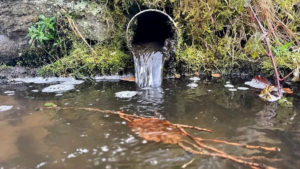The state of UK sewage discharge is in murky waters
 University of Manchester’s Professor Jamie Woodward has recently featured in The Conversation for his piece on UK water companies not sharing enough information on their sewage discharge practices.
University of Manchester’s Professor Jamie Woodward has recently featured in The Conversation for his piece on UK water companies not sharing enough information on their sewage discharge practices.
Woodward first demonstrated that water companies are the main cause of microplastic contamination in UK rivers by releasing untreated wastewater during dry weather into rivers that are too sluggish to wash microplastics downstream. Jamie’s research then connected microplastic pollution of rivers with the national scandal of water companies dumping untreated sewage. The ground-breaking work with national policymakers has changed the entire discourse around water pollution in rivers by ensuring microplastics were included in discussions around new Government legislation for environmental protection resulting in a new level of scrutiny of the water companies.
Professor Woodward states in The Conversation: “Water companies in England have failed to invest sufficiently in wastewater treatment and sewerage infrastructure to keep pace with increasing populations and more intense rainfall. To take pressure off their sewer networks, companies allow huge volumes of untreated wastewater and sewage to be dumped into our rivers and coastal waters.”
“In the absence of effective regulation since the Environment Agency’s monitoring budget was slashed just over a decade ago, dumping sewage in rivers has contributed to a spectacularly profitable business model. Sewage pollution incidents – many of which were legal – increased 29-fold over five years and countless urban rivers are now effectively extensions of the sewerage network. Our rivers are running out of time.”
With a new demand from the UK Environment Secretary for water companies to explain how they will reduce sewage discharges into rivers, Jamie recommends starting by coming clean on how much sewage is being dumped. “If we don’t know how much sewage is actually being released – for at least the worst offending locations – we won’t be able to measure environmental and industry improvement with any confidence.”
The absence of reliable baseline data on sewage dumping is a major problem and research has shown that water companies have not reported the full scale of their discharges. As such, Woodward suggests that people need accurate information on what is happening to their local rivers so they can identify the worst offending discharge sites and hold water companies to account.
